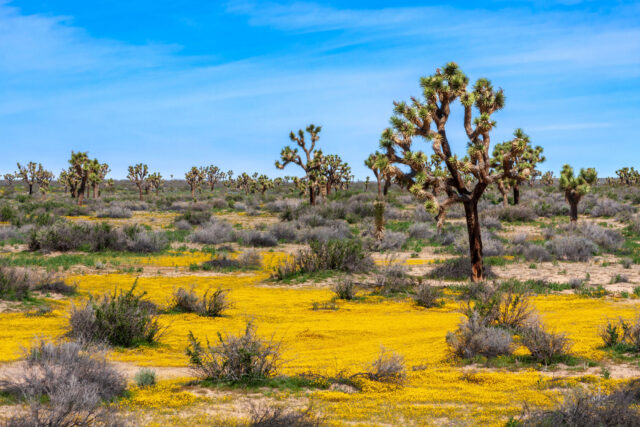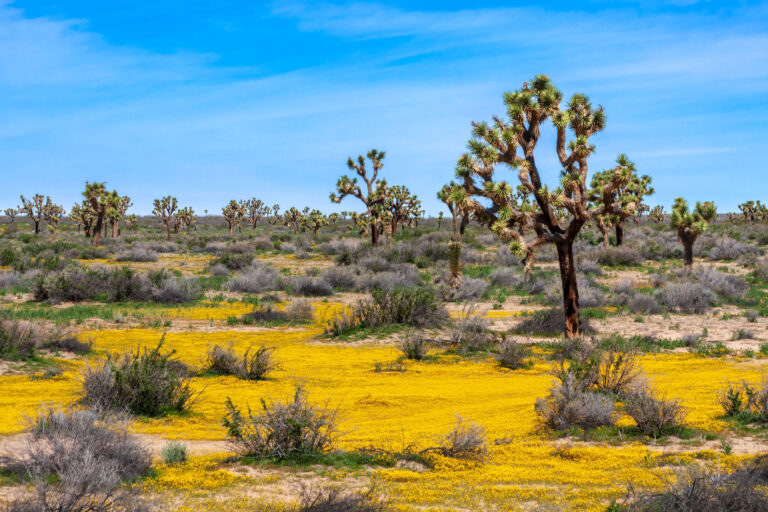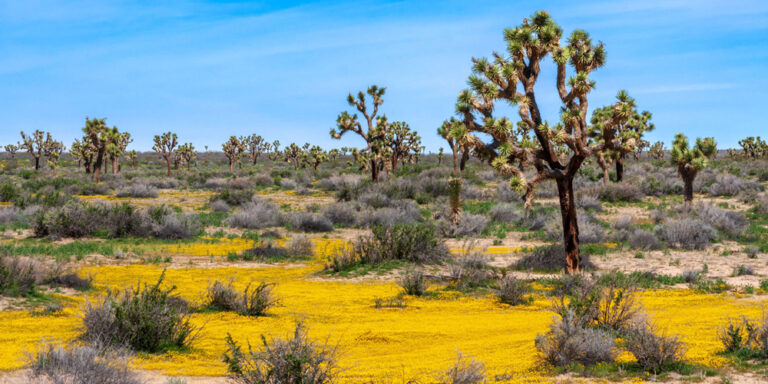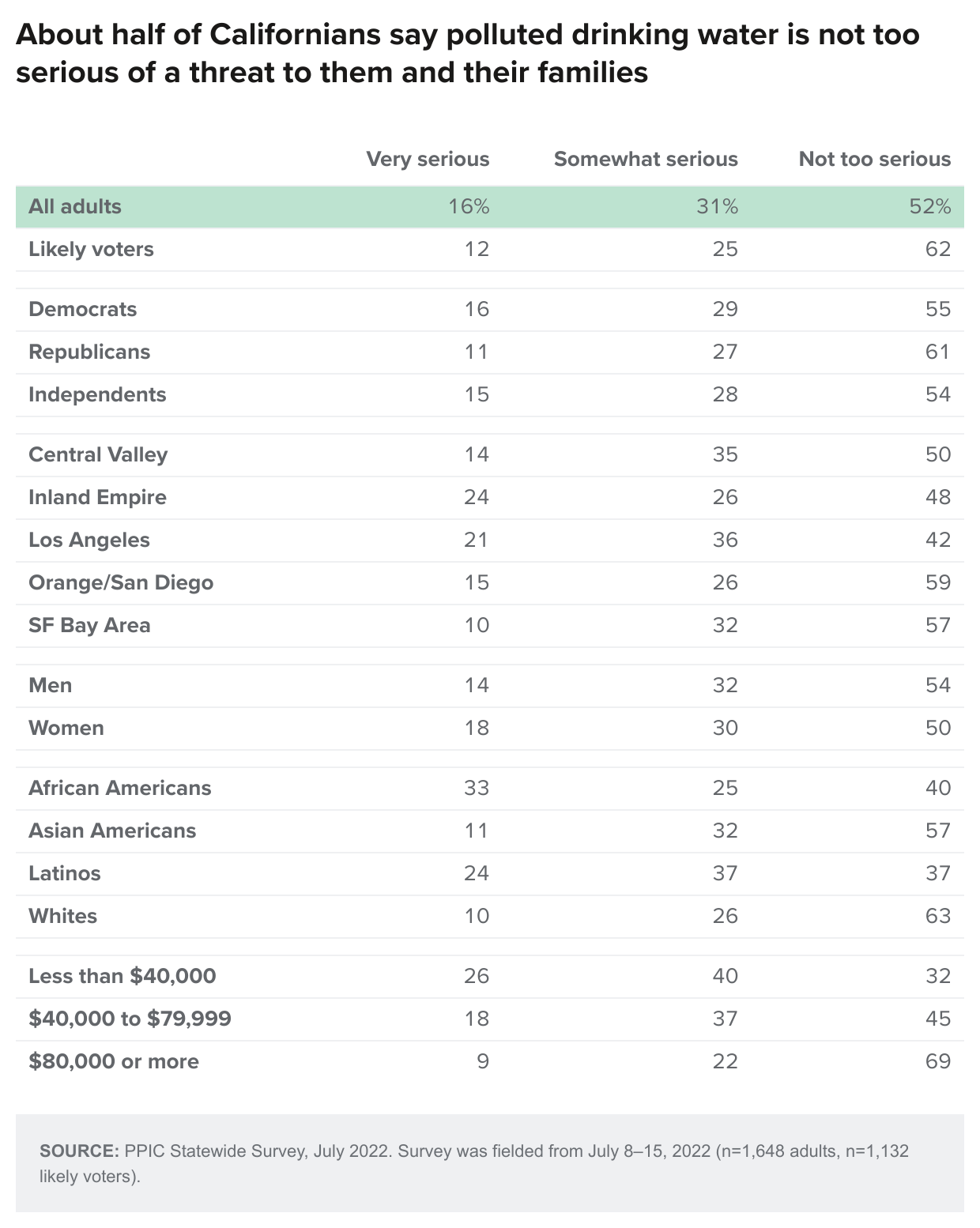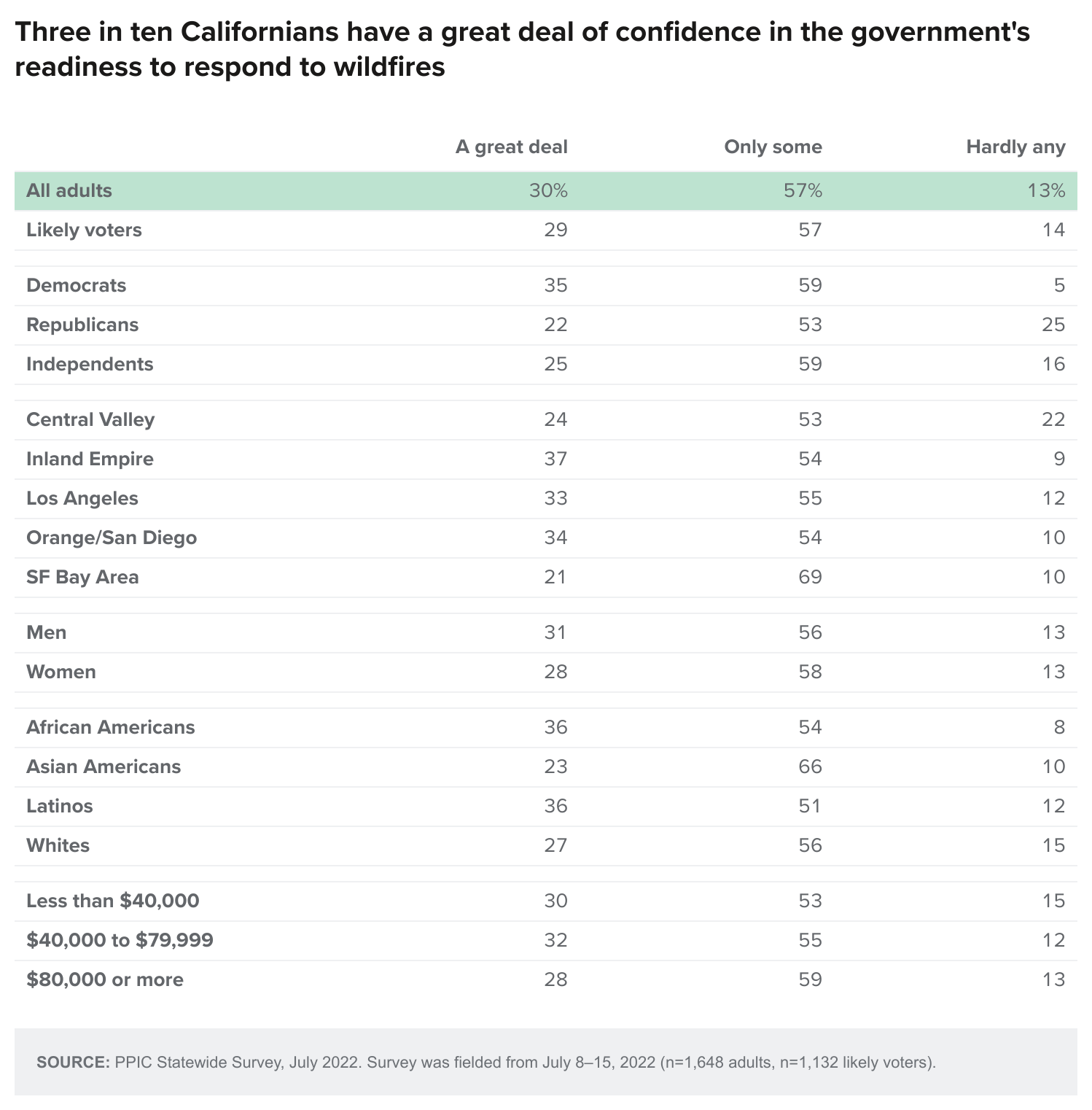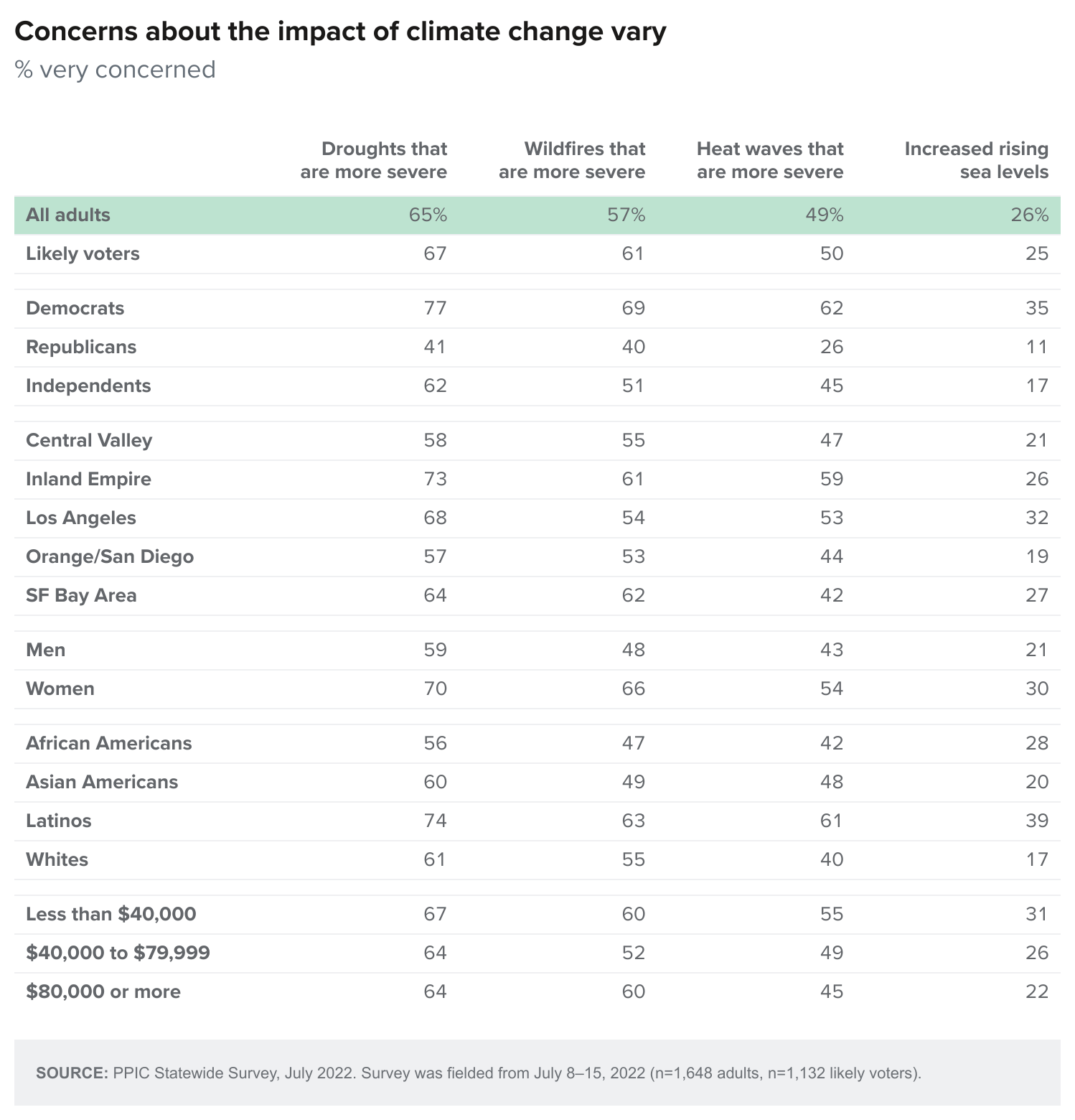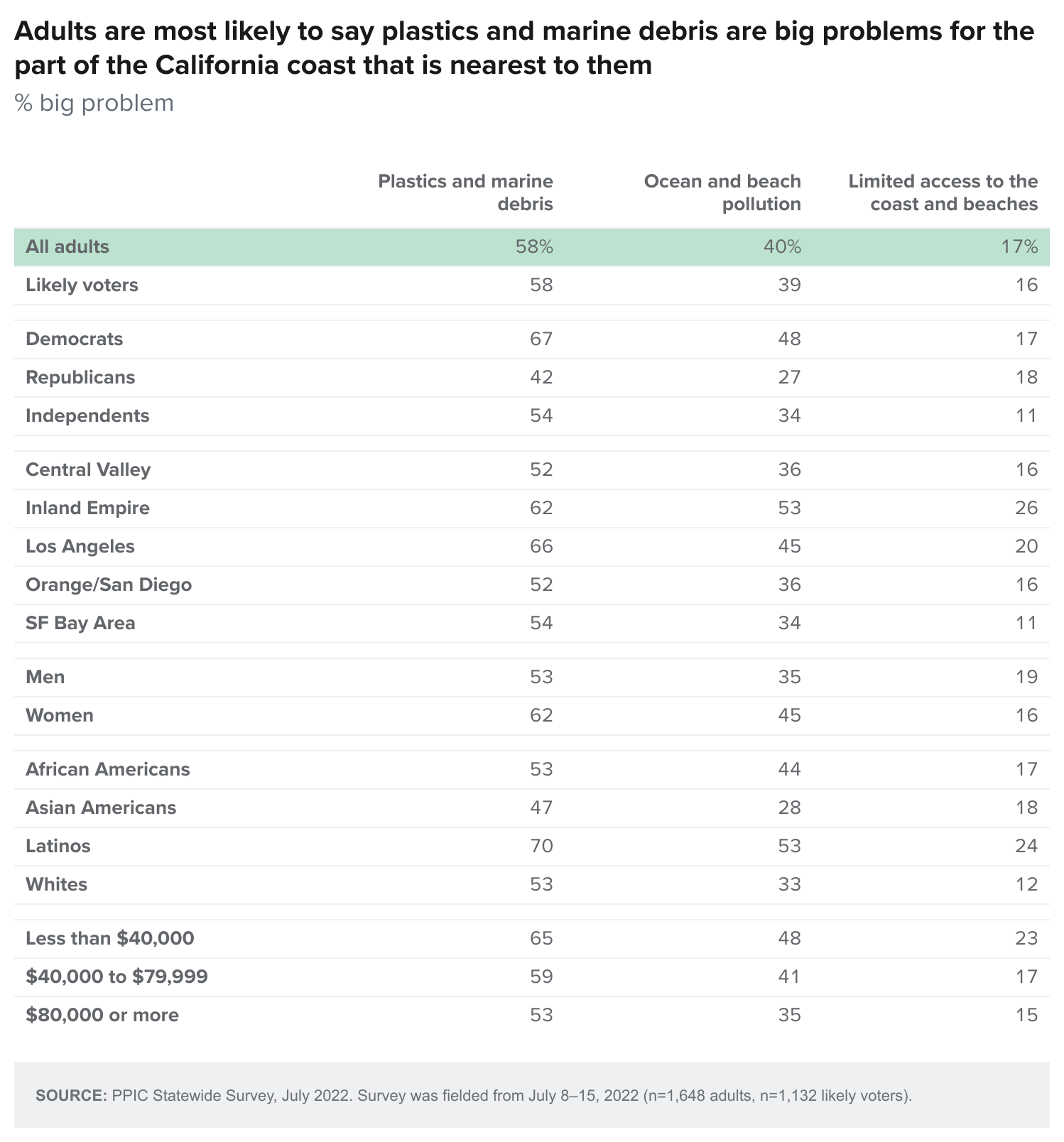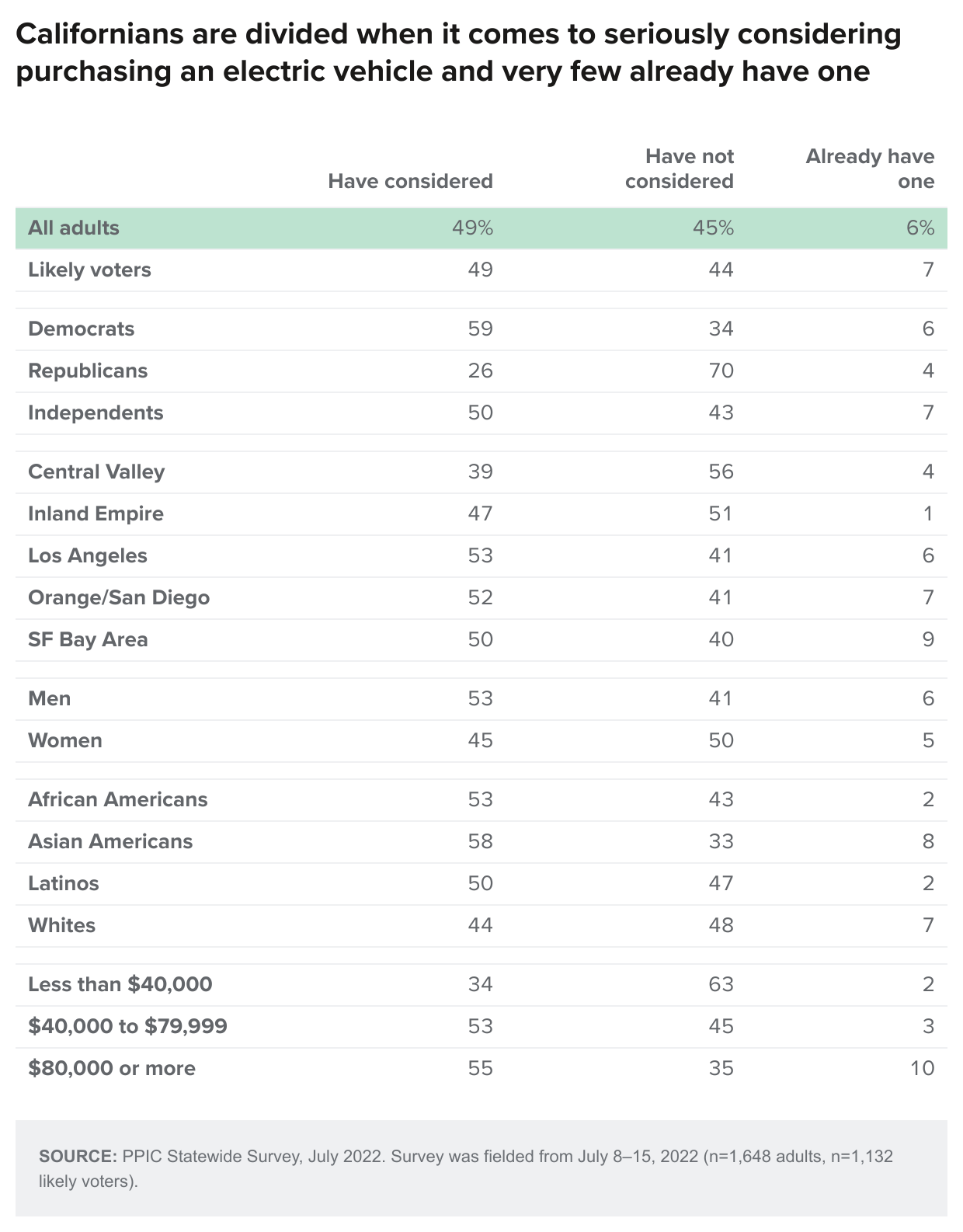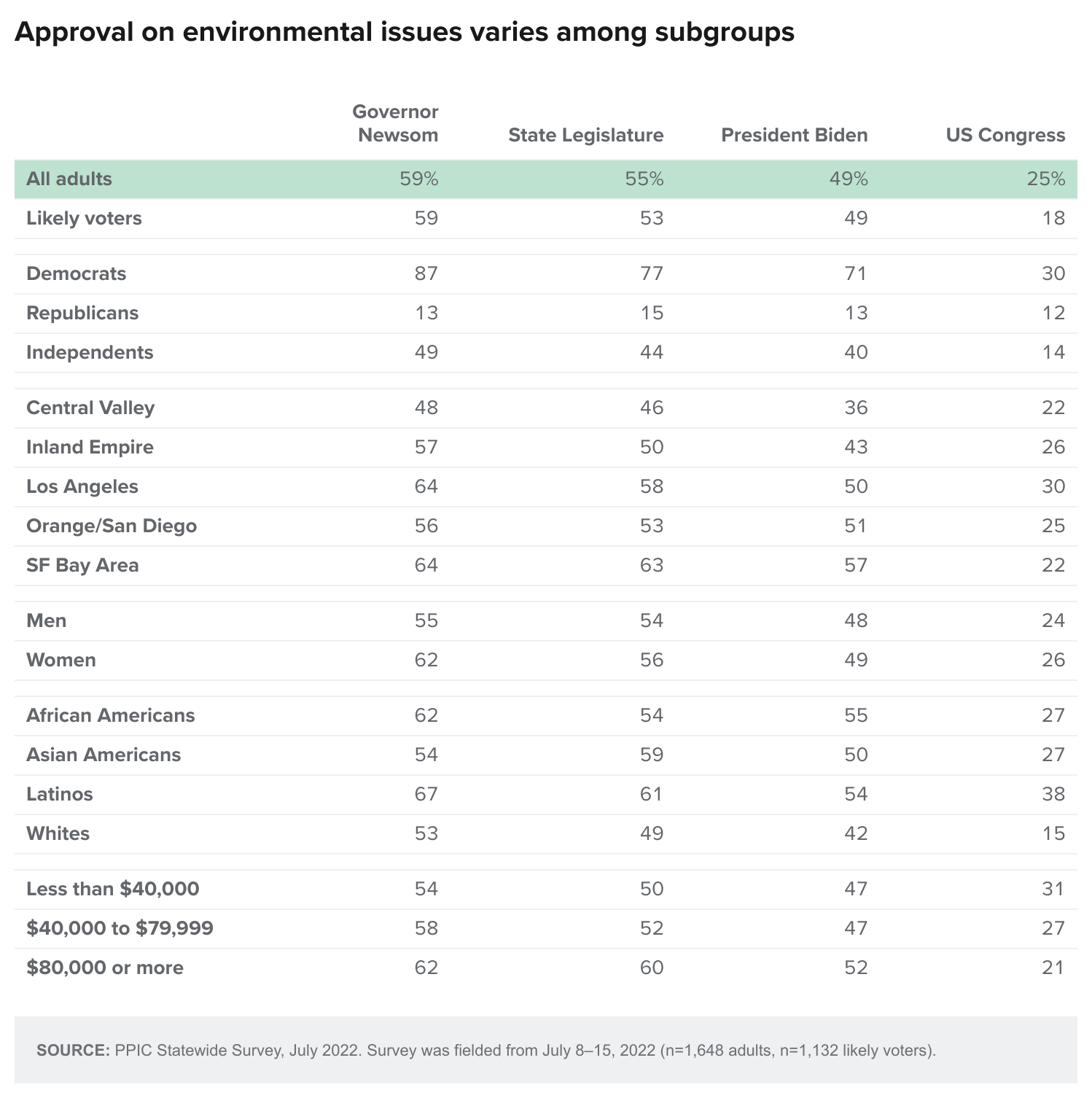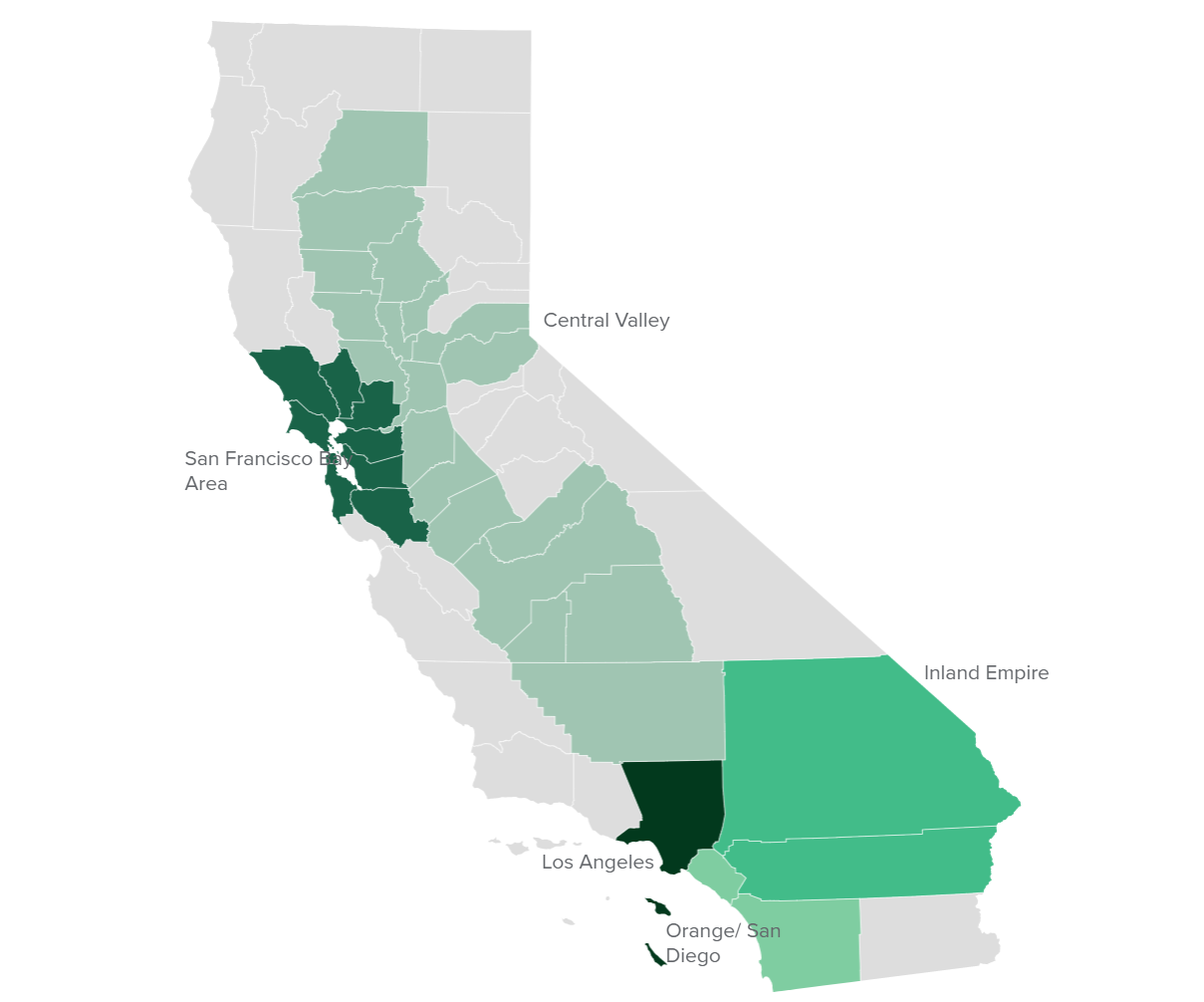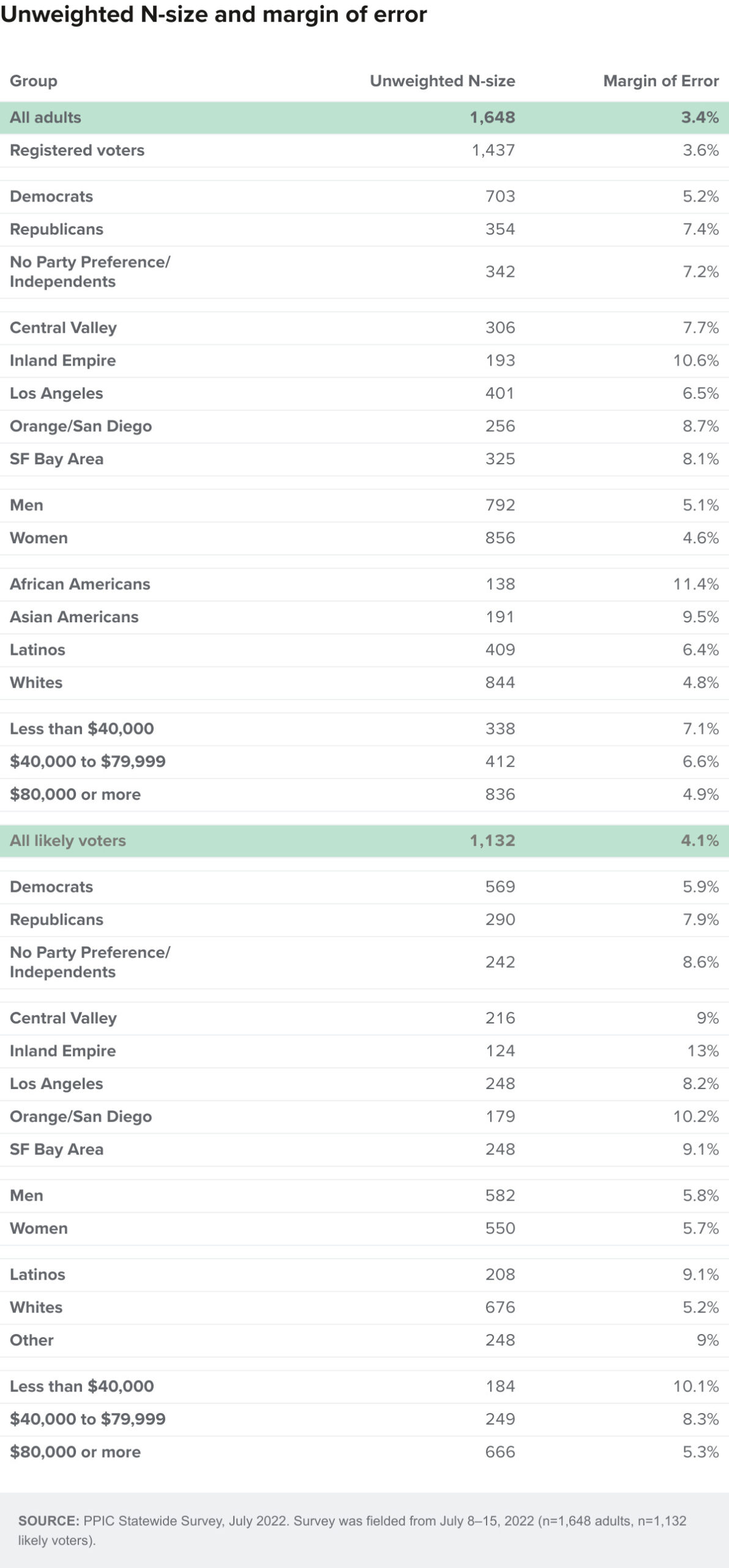Table of Contents
- Key Findings
- Water and Drought
- Wildfires
- Climate Change Perceptions and Policies
- Ocean, Coast, and Marine Life
- Environment, Economy, and Energy
- State and Federal Approval Ratings
- Regional Map
- Methodology
- Questions and Responses
- Authors and Acknowledgments
- PPIC Statewide Advisory Committee
- PPIC Board of Directors
- Copyright
Key Findings
With California facing a severe drought and wildfire season, public awareness has risen of the impact of climate change as well as state policies to reduce greenhouse gas emissions. A sharp increase in petroleum prices has led to discussions about expanding oil production and renewable energy sources. These are among the key findings of a statewide survey on environmental issues conducted by the Public Policy Institute of California from July 8 to 15, 2022:
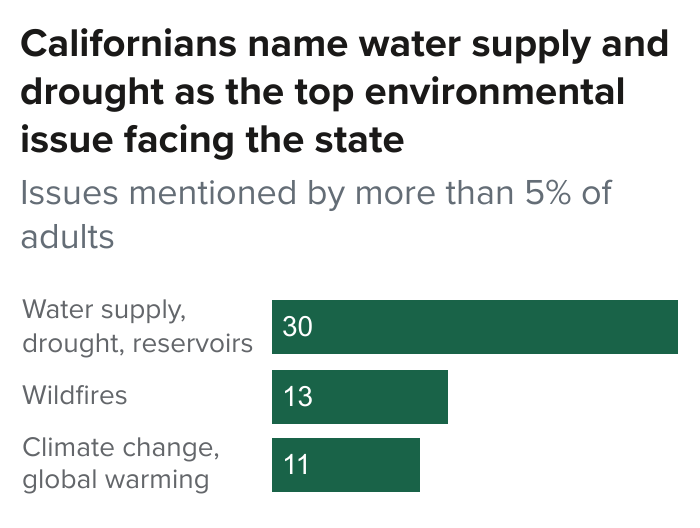 Californians are most likely to name water supply and drought, followed by wildfires and climate change, as the most important environmental issue facing the state today. Nearly nine in ten likely voters say candidates’ positions on the environment are important—and 45 percent say they are very important—in voting for governor in 2022. Fifty-nine percent approve of Governor Newsom’s handling of the environment, with partisans divided.
Californians are most likely to name water supply and drought, followed by wildfires and climate change, as the most important environmental issue facing the state today. Nearly nine in ten likely voters say candidates’ positions on the environment are important—and 45 percent say they are very important—in voting for governor in 2022. Fifty-nine percent approve of Governor Newsom’s handling of the environment, with partisans divided.- Sixty-eight percent of Californians say that the supply of water is a big problem in their part of California. Strong majorities also feel that neither the state and local government nor people in their part of California are doing enough in response to the drought. Forty-five percent say they have done a lot to reduce water use recently in response to the drought. Seventy-seven percent say climate change has contributed to the current drought.
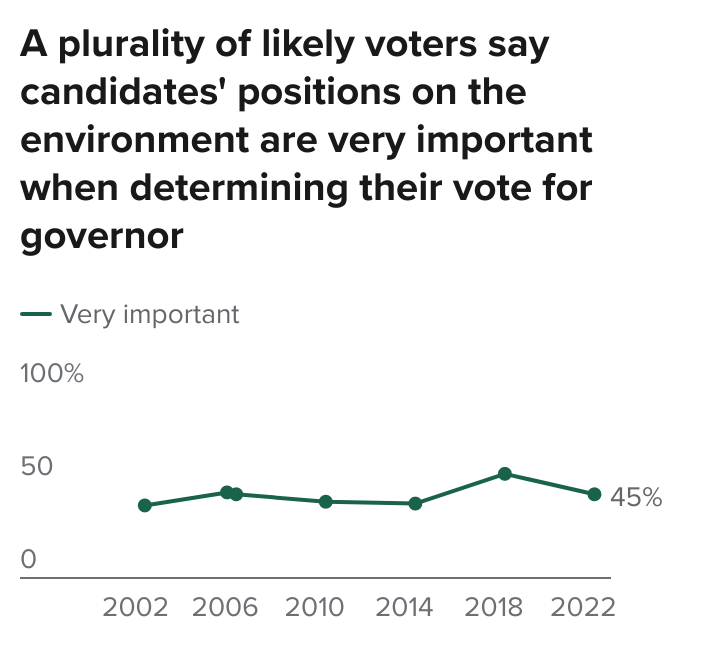 Forty-five percent of Californians say that the threat of wildfires is a big problem in their part of California. Majorities say that they are at least somewhat concerned about the threat of power shutoffs to prevent wildfires where they live. Three in ten have a great deal of confidence in the government’s readiness to respond to wildfires in their part of California. Seventy-six percent say climate change has contributed to the recent wildfires.
Forty-five percent of Californians say that the threat of wildfires is a big problem in their part of California. Majorities say that they are at least somewhat concerned about the threat of power shutoffs to prevent wildfires where they live. Three in ten have a great deal of confidence in the government’s readiness to respond to wildfires in their part of California. Seventy-six percent say climate change has contributed to the recent wildfires.- Sixty-nine percent of Californians say that the effects of climate change have already begun. Eight in ten Californians say that climate change is a very or somewhat serious threat to California’s future economy and quality of life. A strong majority favors the state government making its own policies, separate from the federal government, to address climate change. Support for the state’s climate change policies is deeply divided along party lines.
- Fifty-eight percent of Californians say the condition of oceans and beaches is very important to California’s future economy and quality of life. Majorities say that plastics and marine debris are a big problem on the coast near them. Overwhelming majorities favor wind power and wave energy projects and building desalination plants. A strong majority oppose allowing more oil drilling off the California coast.
- Forty-four percent of Californians are upset about the current rate of inflation, and 55 percent say that recent gas prices have caused them financial hardship. Overwhelming majorities favor developing renewable energy sources over expanding oil, coal, and natural gas production. Forty-nine percent have seriously considered getting an electric vehicle. Forty-nine percent approve of President Biden’s handling of environmental issues.
Water and Drought
As the state grapples with water conservation and critically low reservoirs in the ongoing drought, three in ten or more Californians (30% adults, 36% likely voters) mention water supply and drought as the most important environmental issue facing California today. Californians mention wildfires (13% adults, 14% likely voters) and climate change (11% adults, 14% likely voters) in lower and similar shares. When asked about the supply of water in their part of California, about two in three adults (68%) and more than three in four likely voters (77%) say it is a big problem—up from a year ago (63% adults, 69% likely voters). Today, solid majorities across regions and political and demographic groups say this.
When it comes to responding to the current drought, most (68% adults, 75% likely voters) say state and local governments are not doing enough; less than three in ten say they are doing the right amount (27% adults, 21% likely voters), and far fewer say they are doing too much (4% adults and likely voters). The share saying the government is not doing enough is similar to last July. Today, majorities across partisan and demographic groups and across regions are dissatisfied.
Mirroring their dissatisfaction with governmental response, 69 percent of Californians (72% likely voters) say the people in their part of the state are not doing enough to respond to the current drought, about a quarter say they are doing the right amount (26% adults, 24% likely voters), and few say they are doing too much (4% adults, 3% likely voters). Solid majorities across partisan and demographic groups and across regions say people are not doing enough.
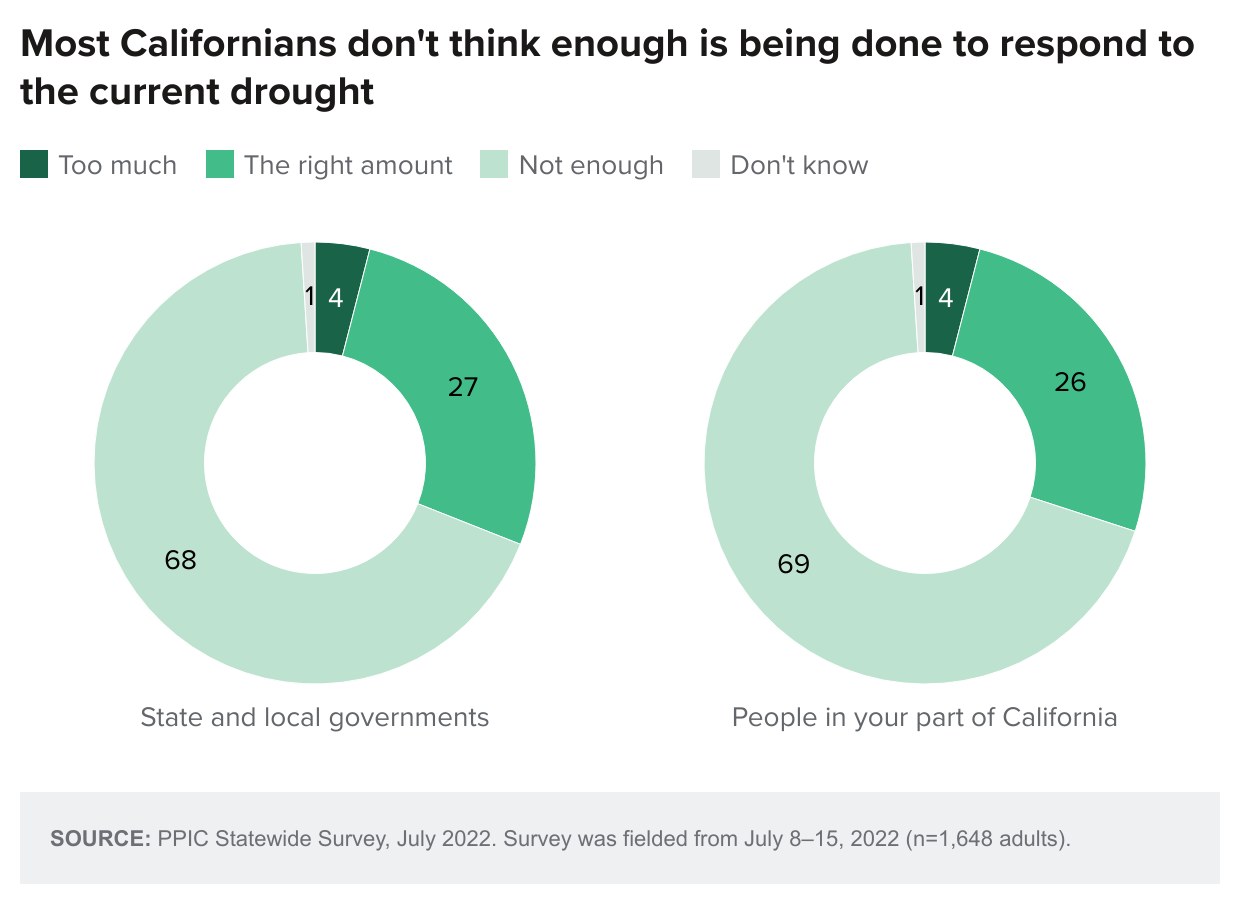
While most Californians are dissatisfied with the efforts of their neighbors, 45 percent say they have done a lot to reduce water use (39% done a little; 16% have not taken steps to reduce use). About half or fewer across racial/ethnic, education, gender, and income groups say they have done a lot. Half or fewer across the state’s regions say this, with shares highest in Los Angeles (51%) and lowest in Orange/San Diego (38%). Adults with higher incomes (40% $80,000 or more) are somewhat less likely to say they have done a lot than those with lower incomes (49% $40,000 to $79,999, 47% less than $40,000).
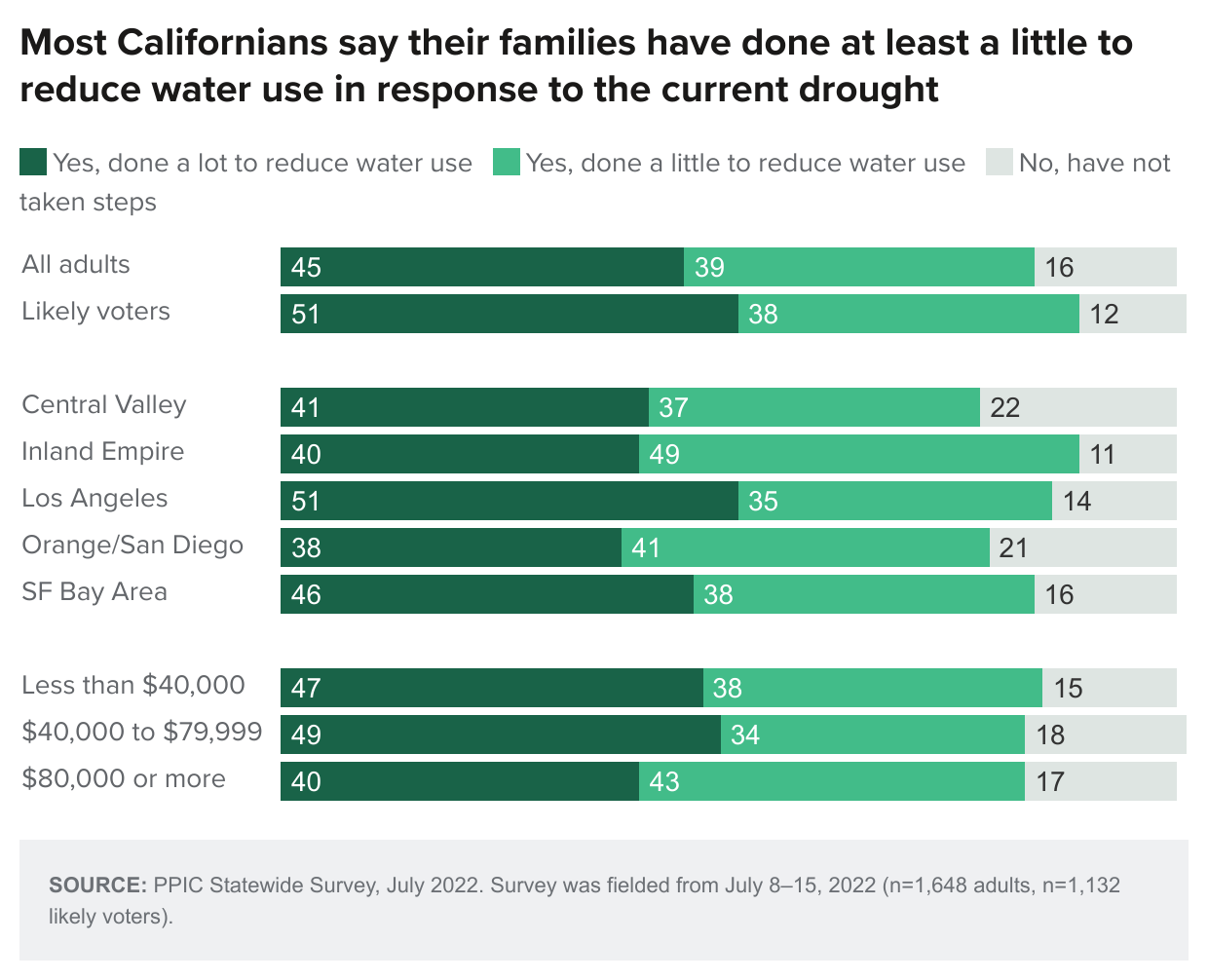
When it comes to the pollution of drinking water, about half of adults say it is not too serious a health threat to them and their family in their part of California (52%), compared to about 47 percent who say it is a very serious (16%) or a somewhat serious threat (31%). Among racial/ethnic groups, African Americans (33%) and Latinos (24%) are most likely to say this is a very serious threat, compared to fewer Asian Americans (11%) and whites (10%). Nearly seven in ten Californians say polluted drinking water is a more serious health threat in lower income areas.
Wildfires
More than eight in ten Californians say the threat of wildfires is at least somewhat of a problem in their part of California—while 45 percent of adults and 47 percent of likely voters say it is a big problem. The share saying the threat is a big problem is lower than it was one year ago (55% adults, 57% likely voters). Today, half of Democrats, 46 percent of Republicans, and 40 percent of independents say this. Four in ten or more across most demographic groups say it is a big problem, with the exception of 35 percent of Asian Americans. Residents of the Inland Empire are somewhat more likely than residents of other regions to say it is a big problem.
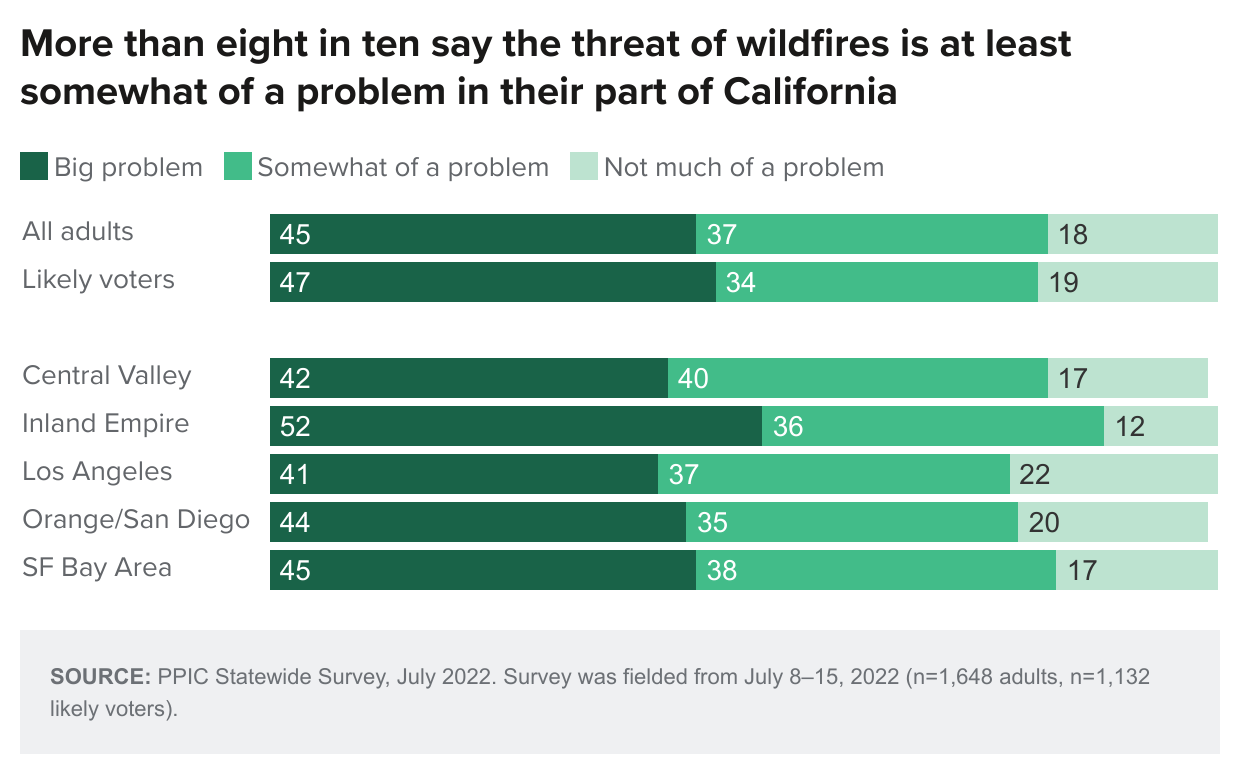
A majority of Californians are at least somewhat concerned about the threat of power shutoffs to prevent wildfires where they live—including about two in ten who say they are very concerned (18% adults, 19% likely voters). Among partisans, Republicans (23%) are somewhat more likely to say they are very concerned, compared to 16 percent of both Democrats and independents. About two in ten or fewer across demographic groups say they are very concerned. Across the state’s major regions, residents of the Inland Empire are more likely than Californians in other regions to say they are very concerned. The share saying they are very concerned decreases as income levels increase.
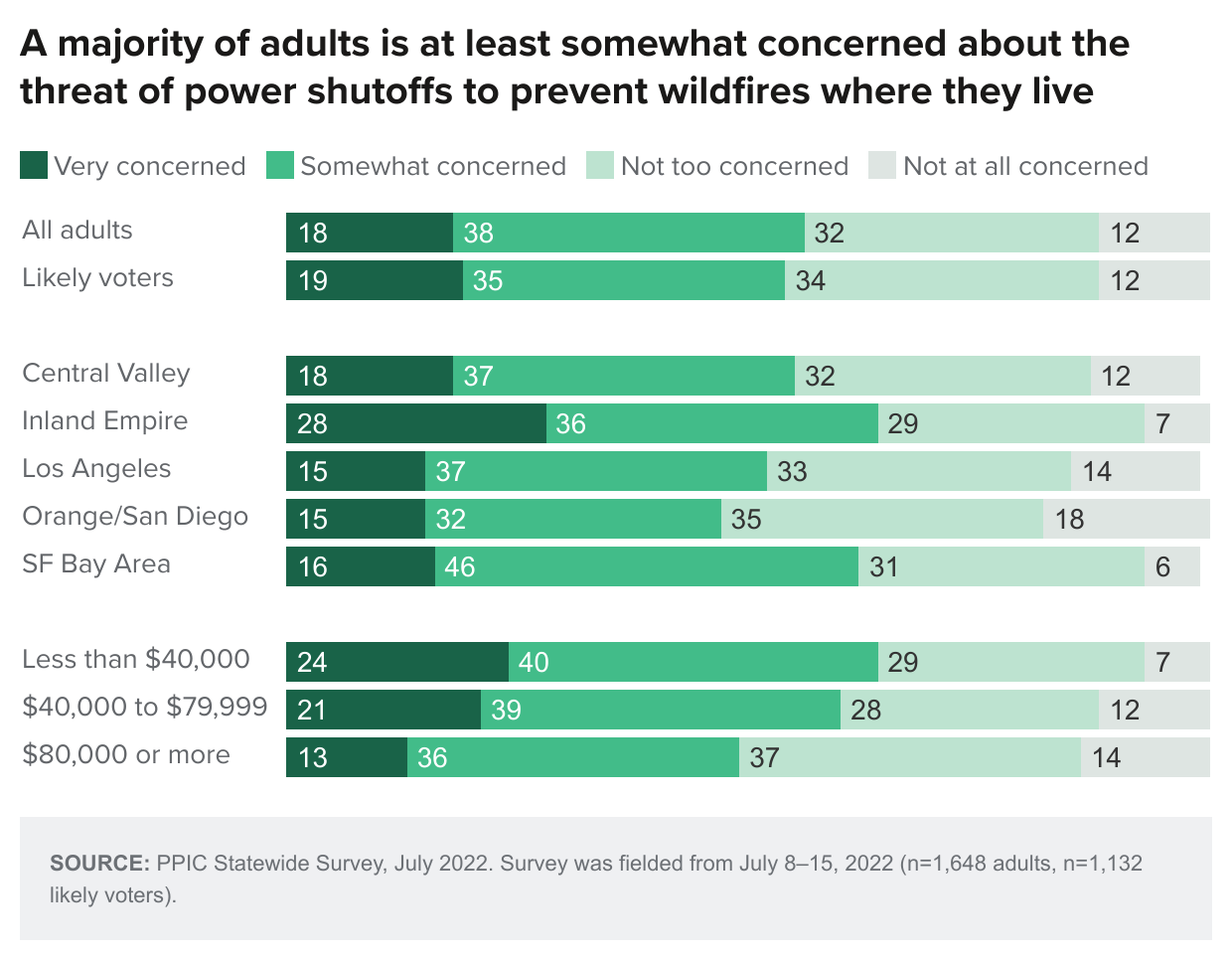
Most Californians have at least some confidence in the government’s readiness to respond to wildfires, but only three in ten express a great deal of confidence (57% only some, 13% hardly any). Last year, a similar share (33%) said they have a great deal of confidence. Today, at least two in ten across demographic groups have a great deal of confidence, as do two in ten or more across regions. Central Valley residents are about twice as likely as residents in other regions to say they have hardly any confidence.
Climate Change Perceptions and Policies
Nearly seven in ten Californians think that the effects of climate change have already begun. Findings were similar last year, and majorities have said this since 2005. Today, 81 percent of Democrats, 73 percent of independents, and 45 percent of Republicans hold this view. Solid majorities across the state’s regions and across age, education, income, and racial/ethnic groups think that the effects of climate change have already begun.
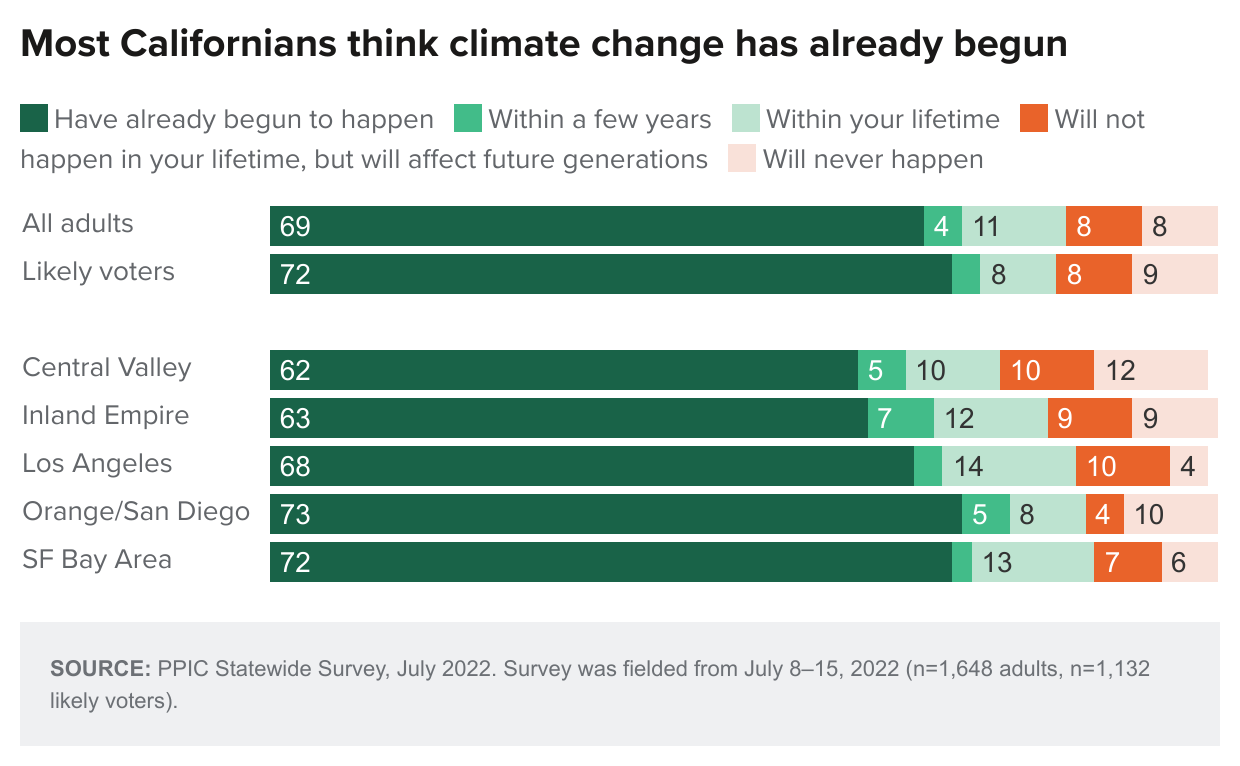
Eight in ten Californians say that climate change is either a top concern to them personally (24%) or one of several important concerns (57%); findings were similar a year ago. Today, there are differences across racial/ethnic groups in naming climate change as a top concern (31% Latinos, 19% Asian Americans, 18% whites, 16% African Americans). Partisans vary in naming climate change as a top concern (31% Democrats, 24% independents, 9% Republicans).
Eight in ten Californians say that climate change is a serious threat (47% very, 33% somewhat) to California’s future economy and quality of life. Findings were similar last July. Today, the perception of climate change as a very serious threat varies by age (56% 18 to 34; 43% 35 to 54; 43% 55 and older) and racial/ethnic group (54% Latinos, 44% whites, 42% Asian Americans, 41% African Americans). Partisans also vary in viewing climate change as a very serious threat for the future (65% Democrats, 45% independents, 20% Republicans).
In this context, 66 percent of Californians and 68 percent of likely voters favor the state government making its own policies, separate from the federal government, to address the issue of climate change. Majorities across regions and demographic groups hold this view, while partisans are deeply divided (89% Democrats, 63% independents, 25% Republicans). Moreover, 71 percent of Californians and 69 percent of likely voters say it is at least somewhat important for California to be a world leader in climate change efforts.
The state’s climate change efforts have varying degrees of public support today. Californians are overwhelmingly in favor of AB 32—which requires the state to reduce greenhouse gas emissions to 40 percent below 1990 levels by 2030 (72% adults, 70% likely voters)—and of SB 100, which requires 100 percent renewable energy sources for the state’s electricity by 2045 (72% adults, 71% likely voters). Governor Newsom’s plan to ban new fracking permits has majority support (59% adults, 61% likely voters) while his executive order to ban the sale of gas-powered vehicles by 2035 has less support (48% adults, 49% likely voters). Partisans are deeply divided on all of these climate change policies.
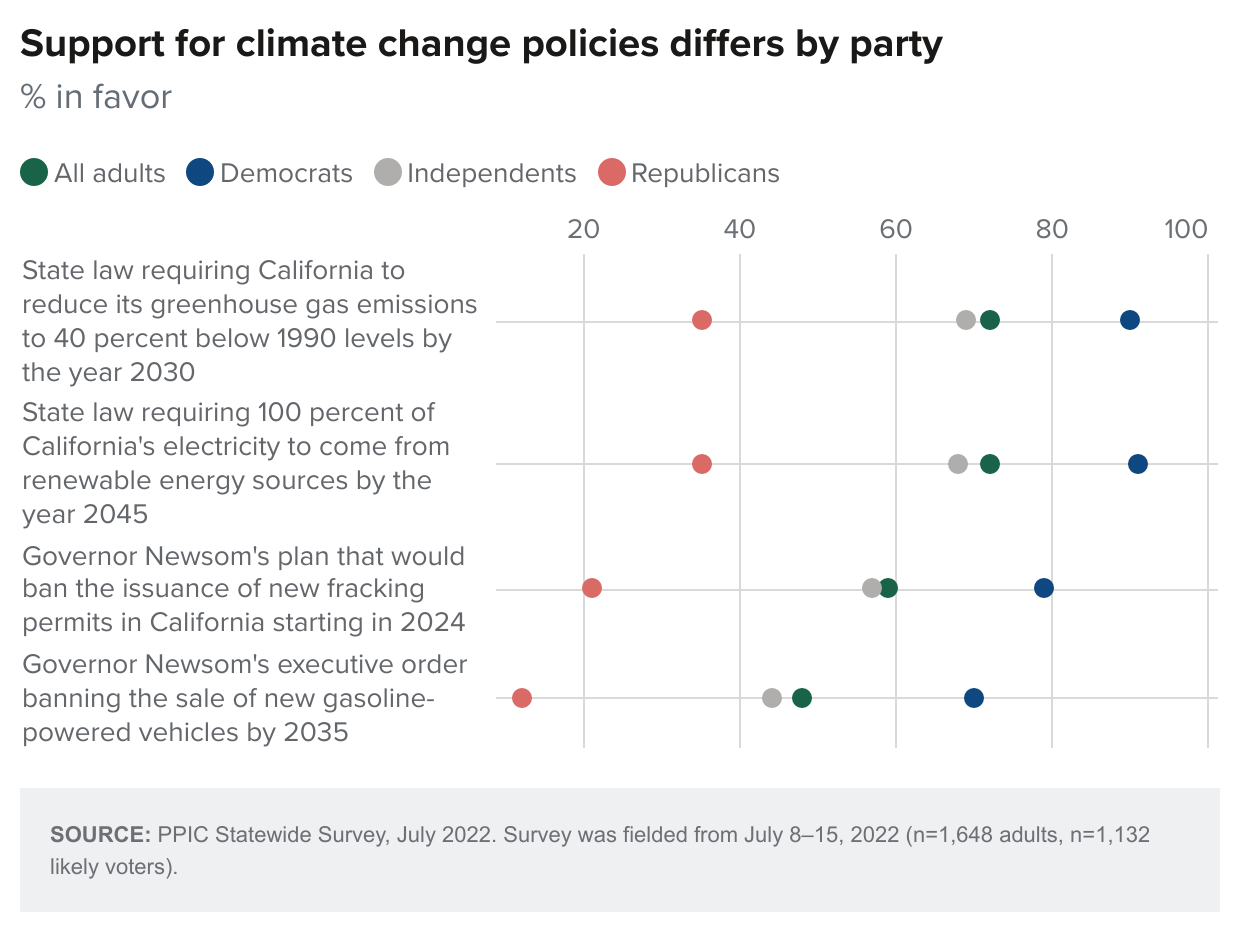
What are the perceived economic impacts of the state’s climate change policies? Forty percent say there will be more jobs for people around the state, 26 percent say there will be fewer jobs, and 32 percent say policies won’t affect the number of jobs. Pluralities across regions and demographic groups—but a majority of Asian Americans (51%)—say there will be more jobs. Across partisan groups, majorities of Democrats (56%) and pluralities of independents (37%) think there will be more jobs, compared to 10 percent of Republicans.
What are the specific environmental concerns related to climate change today? In considering the possible impact of climate change, majorities say they are very concerned about droughts that are more severe (65%) and wildfires that are more severe (57%). Nearly half are very concerned about heat waves that are more severe (49%), while about one in four are very concerned about increased rising sea levels (26%). Across groups, Latinos are more likely than other racial/ethnic groups, women are more likely than men and Democrats are more likely than other voter groups to say they are very concerned about all four potential impacts. Lower-income residents are somewhat more likely than others to say they are very concerned about heat waves that are more severe.
Ocean, Coast, and Marine Life
An overwhelming majority of Californians say the condition of oceans and beaches is important (58% very, 33% somewhat) to California’s future economy and quality of life (6% not too important, 1% not at all important). About half or more across the state’s regions and across age, education, gender, homeownership, income, and racial/ethnic groups say this is very important. About half or more across parties (66% Democrats, 50% Republicans, 49% independents) say that the condition of oceans and beaches is very important for California’s future.
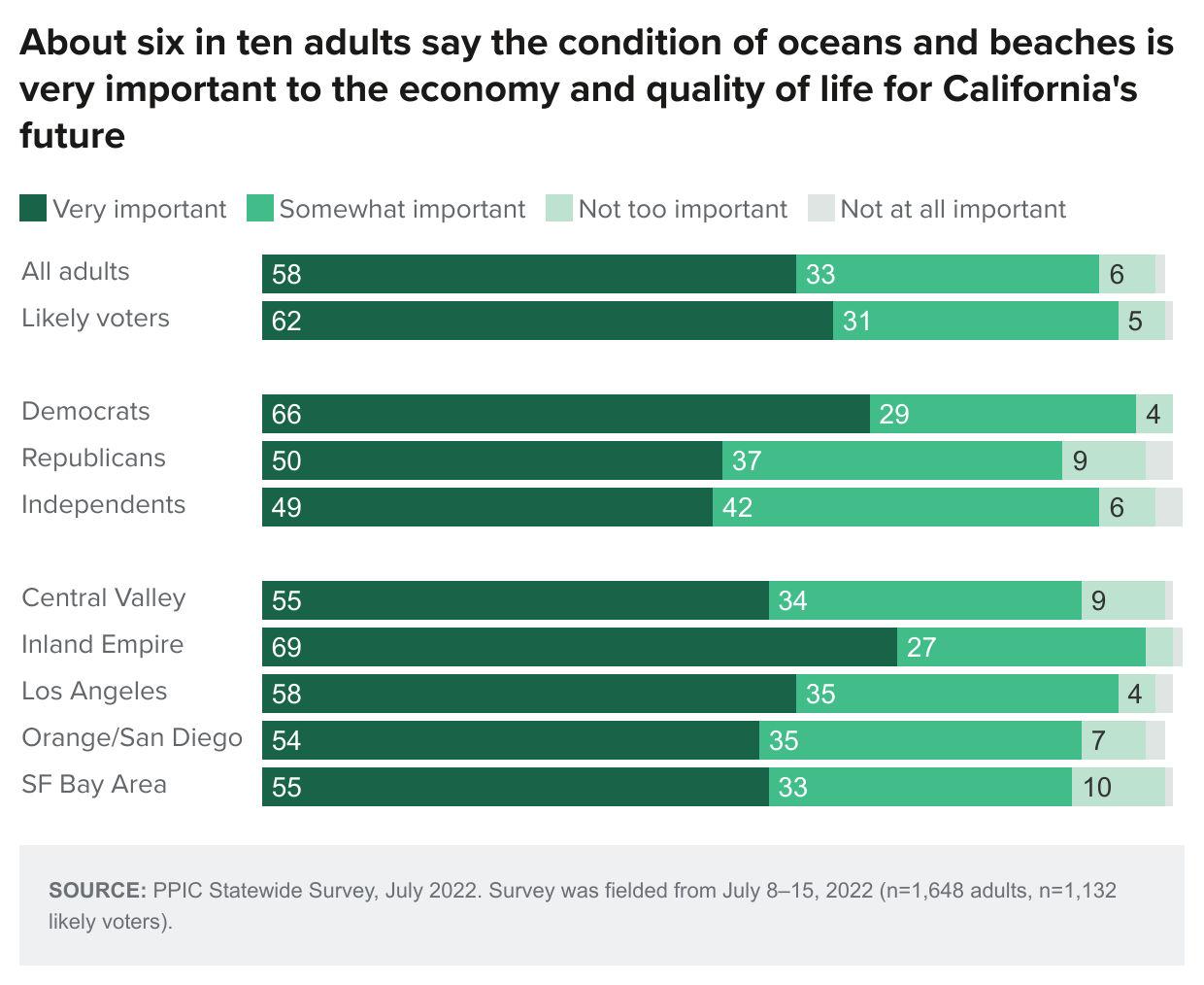
When asked about allowing more oil drilling off the California coast, 67 percent of adults and 65 percent of likely voters are opposed. Majorities across the state’s regions and across age, education, gender, homeownership, income, and racial/ethnic groups are opposed. Partisans are divided (83% Democrats, 66% independents, 31% Republicans) in their opposition to allowing more oil drilling off the California coast.
When asked about wind power and wave energy projects off the coast, overwhelming majorities of adults (81%) and likely voters (85%) are in favor. Overwhelming majorities are in favor across regions and partisan and demographic groups. When asked about building desalination plants on the California coast, overwhelming majorities of adults (72%) and likely voters (79%) are in favor, as are solid majorities across regions and partisan and demographic groups.
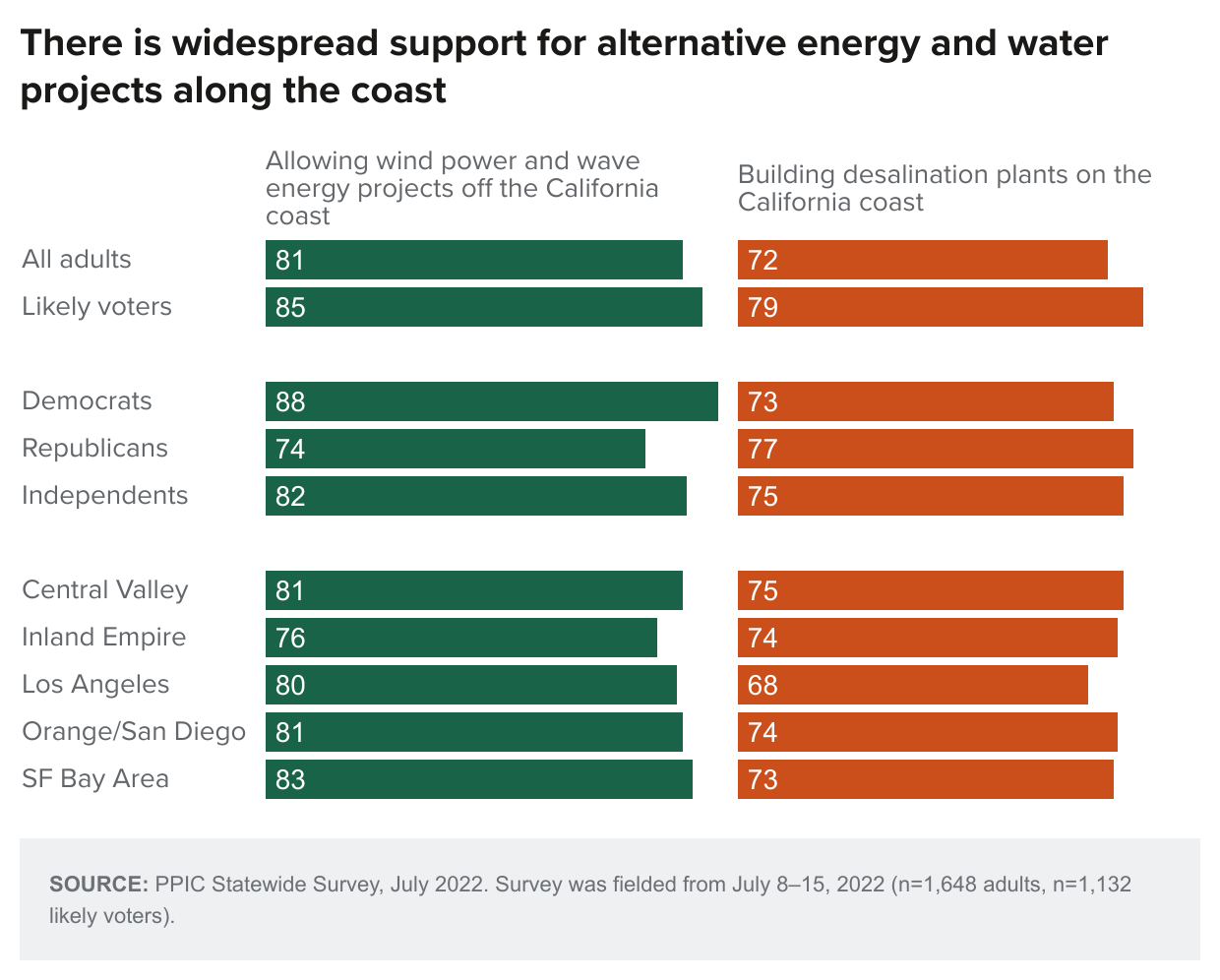
What specific concerns do Californians name when asked about the condition of coasts and beaches closest to them? A majority (58% adults, 58% likely voters) say plastics and marine debris are a big problem. Forty percent of adults and 39 percent of likely voters say that ocean and beach pollution is a big problem. By contrast, 17 percent of adults and 16 percent of likely voters say that limited access to the coast and beaches is a big problem.
Across the state’s major regions, majorities say that plastics and marine debris are a big problem. Lower-income residents are somewhat more likely than higher-income residents to view all three issues as big problems. Latinos are somewhat more likely than other racial/ethnic groups to say all three issues are big problems. Women are more likely than men to say that plastics and marine debris and ocean and beach pollution are big problems. Democrats are much more likely than Republicans and independents to say that plastics and marine debris and ocean and beach pollution are big problems in the part of the coast that is closest to them.
Environment, Economy, and Energy
California continues to have the highest gas prices in the country, averaging just shy of $6 per gallon. When asked if recent increases in gasoline prices have caused any financial hardship for them and their families, 55 percent of adults and 52 percent of likely voters say it has, although about twice as many say it has caused them moderate financial hardship as opposed to severe hardship. Among partisans, Republicans (26%) and independents (20%) are more likely than Democrats (11%) to say prices have caused them severe hardship. Across the state’s major regions, two in ten or more residents in the Inland Empire, Central Valley, and Los Angeles report severe hardship, compared to fewer in Orange/San Diego and the San Francisco Bay Area. Latinos and African Americans are the most likely across racial/ethnic groups to say gas prices have caused them severe hardship. The shares reporting severe financial hardship decrease sharply as educational attainment and income levels rise; those earning less than $40,000 annually are the most likely across demographic groups to say this (36%).
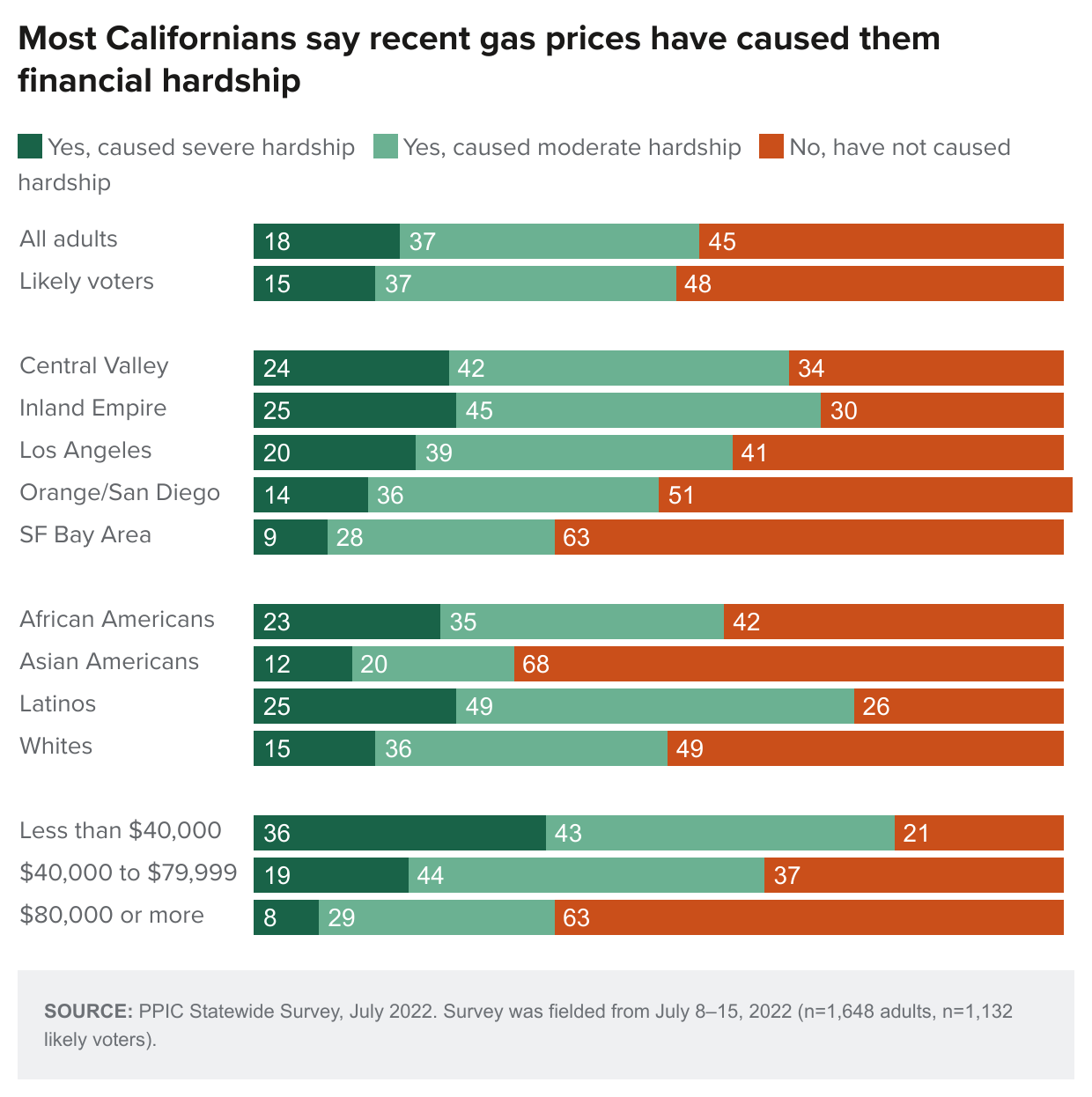
Seventy-four percent of Californians say developing alternative energy sources such as wind, solar, and hydrogen technology is the more important priority for addressing America’s energy supply, while just one in four prioritize expanding exploration and production of oil, coal, and natural gas. Overwhelming majorities of adults also favored alternative energy in July 2021 (80% alternative energy, 18% fossil fuels). Today, partisans hold contrasting views on this issue: overwhelming majorities of Democrats and independents favor alternative energy, while six in ten Republicans favor expanding exploration and production of oil, coal, and natural gas. More than two in three across regions and demographic groups prioritize alternative energy over fossil fuels.
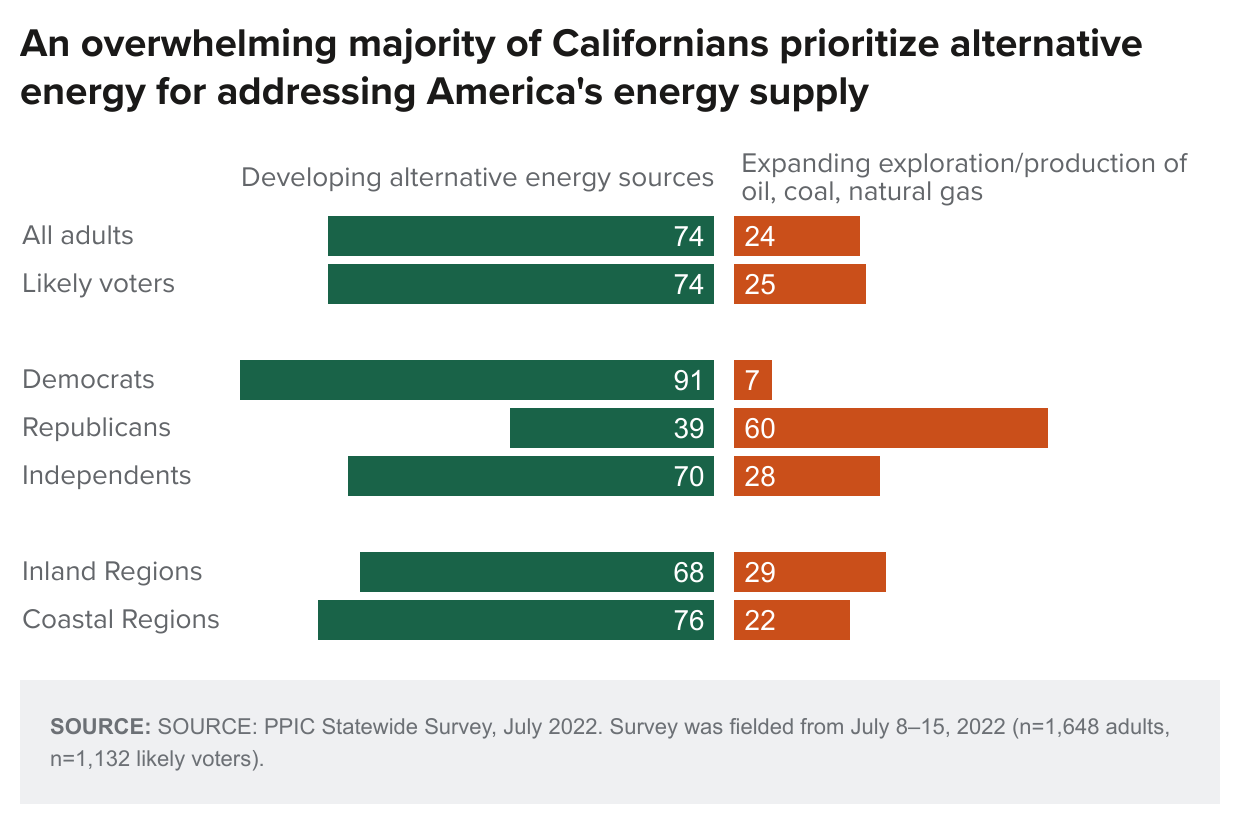
Amid record-setting fuel prices, 49 percent of adults have seriously considered purchasing an electric vehicle (EV), while 45 percent have not; 6 percent say they already have one. Among partisans, Democrats and independents are far more likely to have considered buying an EV than Republicans. Regionally, Los Angeles residents are the most likely and Central Valley residents are the least likely to have considered an EV purchase, while San Francisco Bay Area residents are the most likely to already own one. Among racial/ethnic groups, half or more African Americans, Asian Americans, and Latinos report they have contemplated an electric vehicle purchase, compared to fewer whites. However, Asian Americans and whites are more than twice as likely to own an EV as African Americans or Latinos. Across the remaining demographic groups, men are somewhat more likely than women to have considered buying an EV; consideration falls with increasing age and rises sharply as educational attainment and income increase.
Are Californians willing to pay more for electricity generated by renewable sources, such as solar or wind energy? Forty-four percent are willing, and 55 percent are not. Majorities of Democrats (61%), college graduates (54%), 18- to 34-year-olds (53%), and San Francisco Bay Area residents (52%) are willing to pay more for electricity from renewable sources.
State and Federal Approval Ratings
As Governor Newsom faces reelection in November, about six in ten adults and likely voters approve of the way he is handling environmental issues in California. Majorities have approved of the governor’s handling of the environment since 2020. Today, an overwhelming majority of Democrats (87%) approve, while 85 percent of Republicans disapprove, and independents are divided (49% approve, 47% disapprove). Regionally, approval is higher in coastal areas (62%) than in inland areas (51%). Majorities across demographic groups approve of Governor Newsom’s handling of environmental issues, and approval rises with income levels. Across racial/ethnic groups, approval is higher among Latinos (67%) and African Americans (62%) than it is among Asian Americans (54%) and whites (53%). Nearly nine in ten likely voters say candidates’ positions on the environment are important (45% very, 42% somewhat) in voting for governor.
Fifty-five percent of adults and 53 percent of likely voters approve of the state legislature’s handling of environmental issues; views were similar 12 months ago. Most Democrats (77%) approve of the legislature on this issue, while majorities of Republicans (82%) and independents (53%) disapprove. Across regions, approval is highest in the San Francisco Bay Area (63%) and lowest in the Central Valley (46%). About half or more across demographic groups approve of the legislature’s handling of environmental issues.
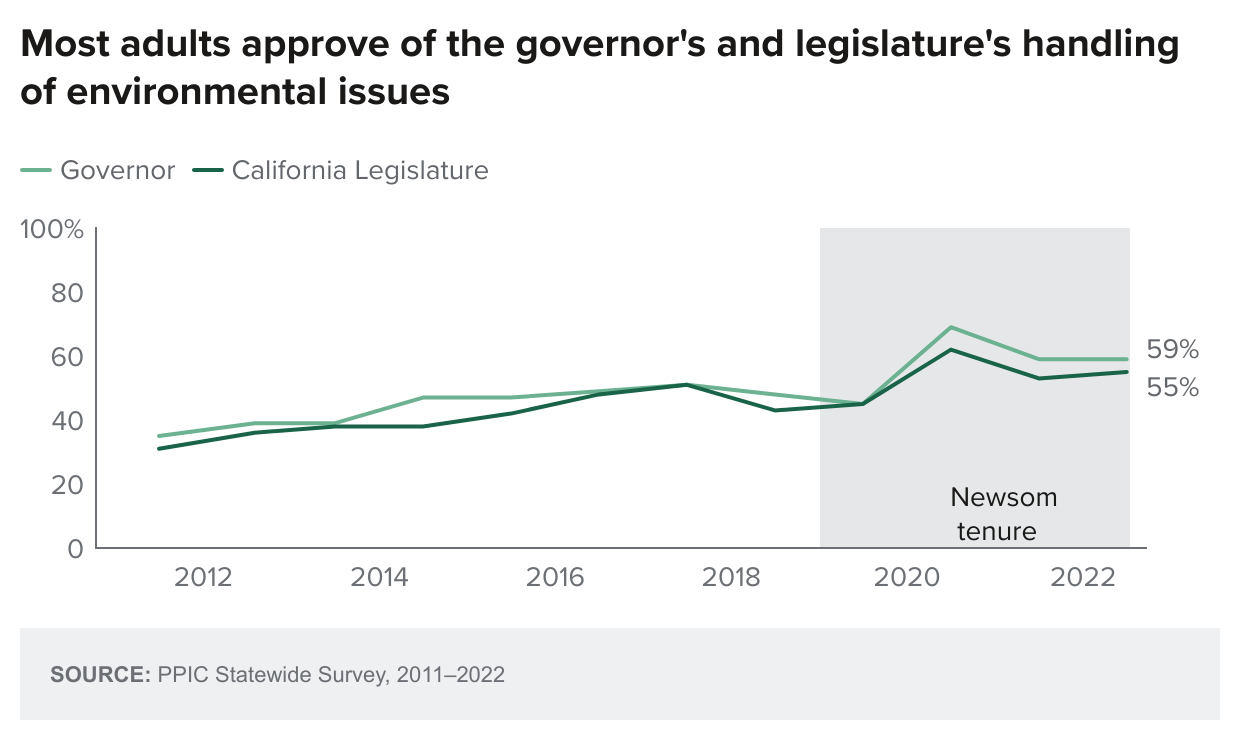
About half of adults (49%) and likely voters (49%) approve of President Biden’s handling of environmental issues in the US. Approval was much higher last July (61% adults, 61% likely voters). Today, partisans hold opposing views: an overwhelming majority of Democrats approve of the president’s handling of environmental issues while an overwhelming majority of Republicans disapprove, as do 54 percent of independents. Regionally, most coastal area residents approve (53%), while most inland area residents disapprove (58%). Across racial/ethnic groups, African Americans (55%) are most likely to approve of Biden on this issue, while whites are least likely (42%). Approval of the president’s handling of environmental issues varies across age, education, and income groups.
In contrast, 25 percent of adults and 18 percent of likely voters approve of the way Congress is handling environmental issues in the US. Approval was higher among adults (35%) and likely voters (28%) a year ago, but majorities have disapproved since 2011. Strong majorities across political parties disapprove of Congress on this issue, and about six in ten or more across regions and across demographic groups disapprove. When asked about the candidates in their district for the 2022 House election, 34 percent said the Republican candidate and 65 percent said the Democratic candidate in their district would do a better job handling environmental issues in the US.
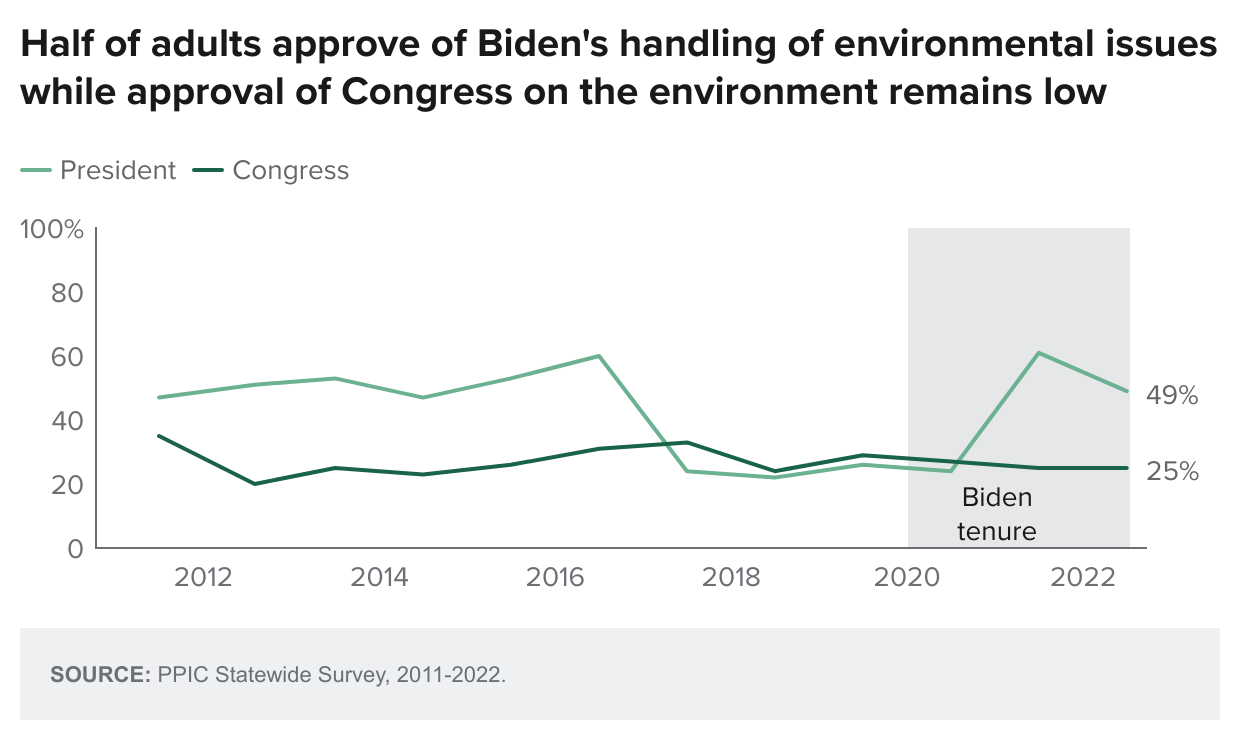
Topics
Drought Economy Forests and Fires Political Landscape Safe Drinking Water Statewide Survey Water Supply Water, Land & AirLearn More
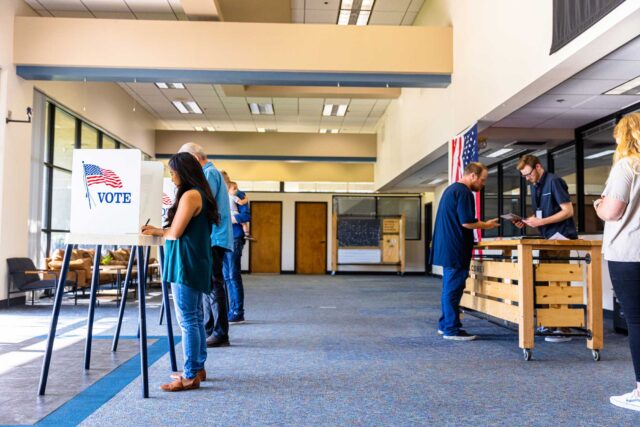
Abortion May Emerge as a Key Issue in California’s Midterm Elections
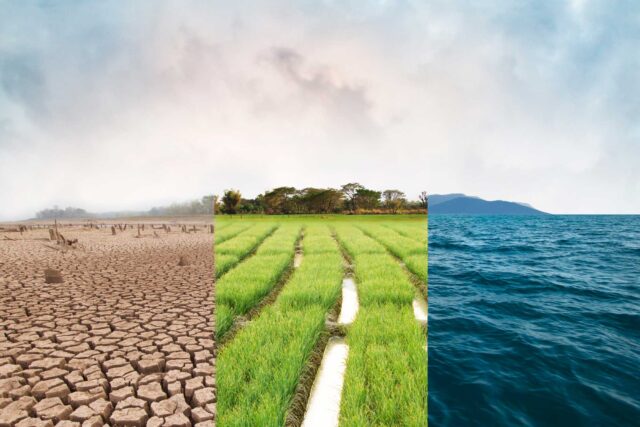
Anxious California Voters Will Weigh In on Climate Policy this Fall
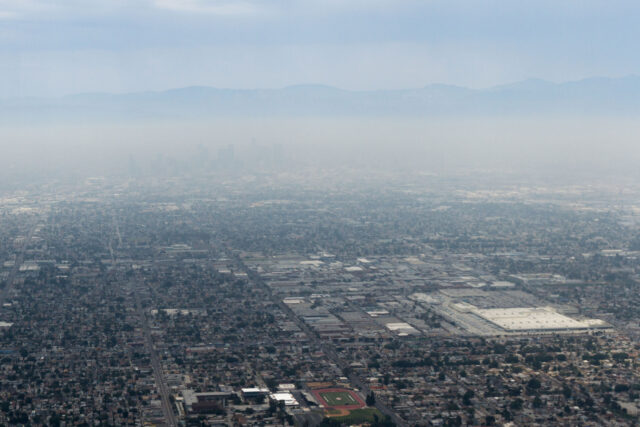
Californians See Air Pollution as a Problem and a Health Threat
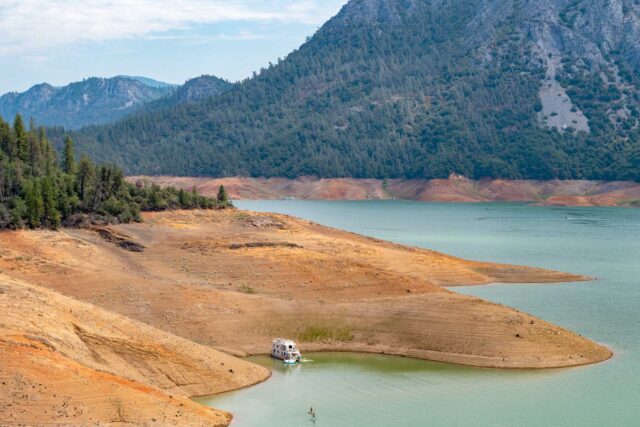
Californians Want the Government to Do More about Drought, Wildfires, and Climate Change
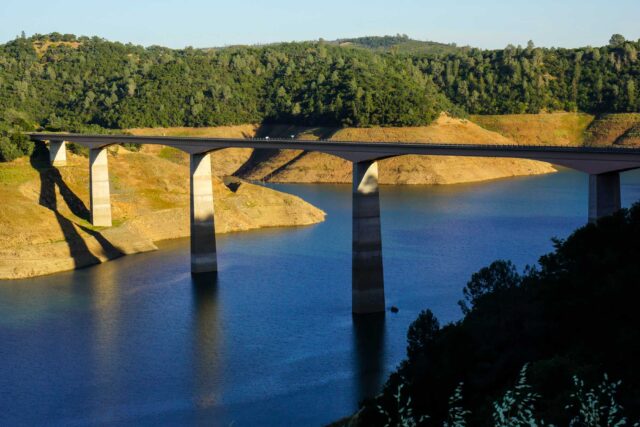
Our Experts Weigh In on the Drought
